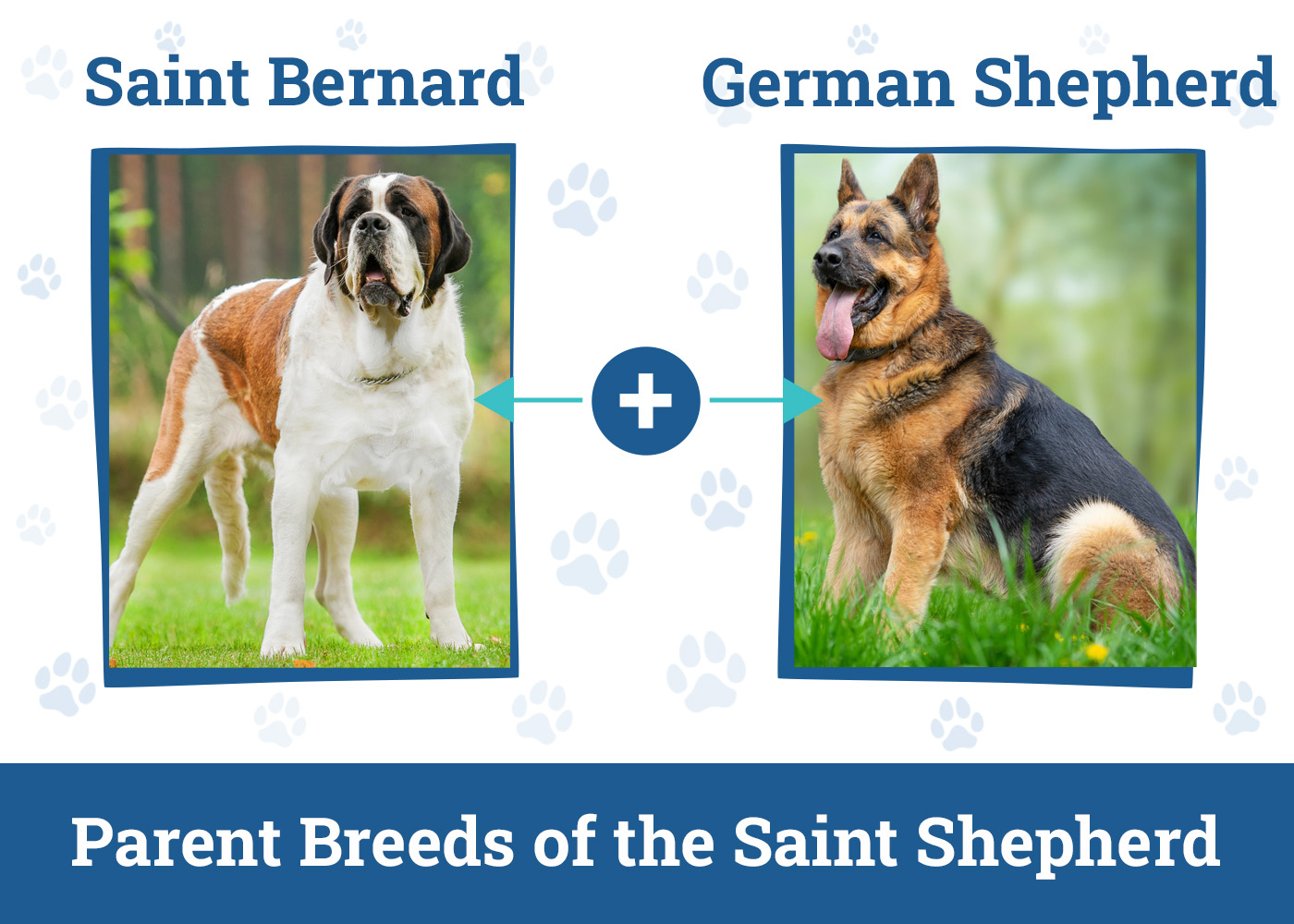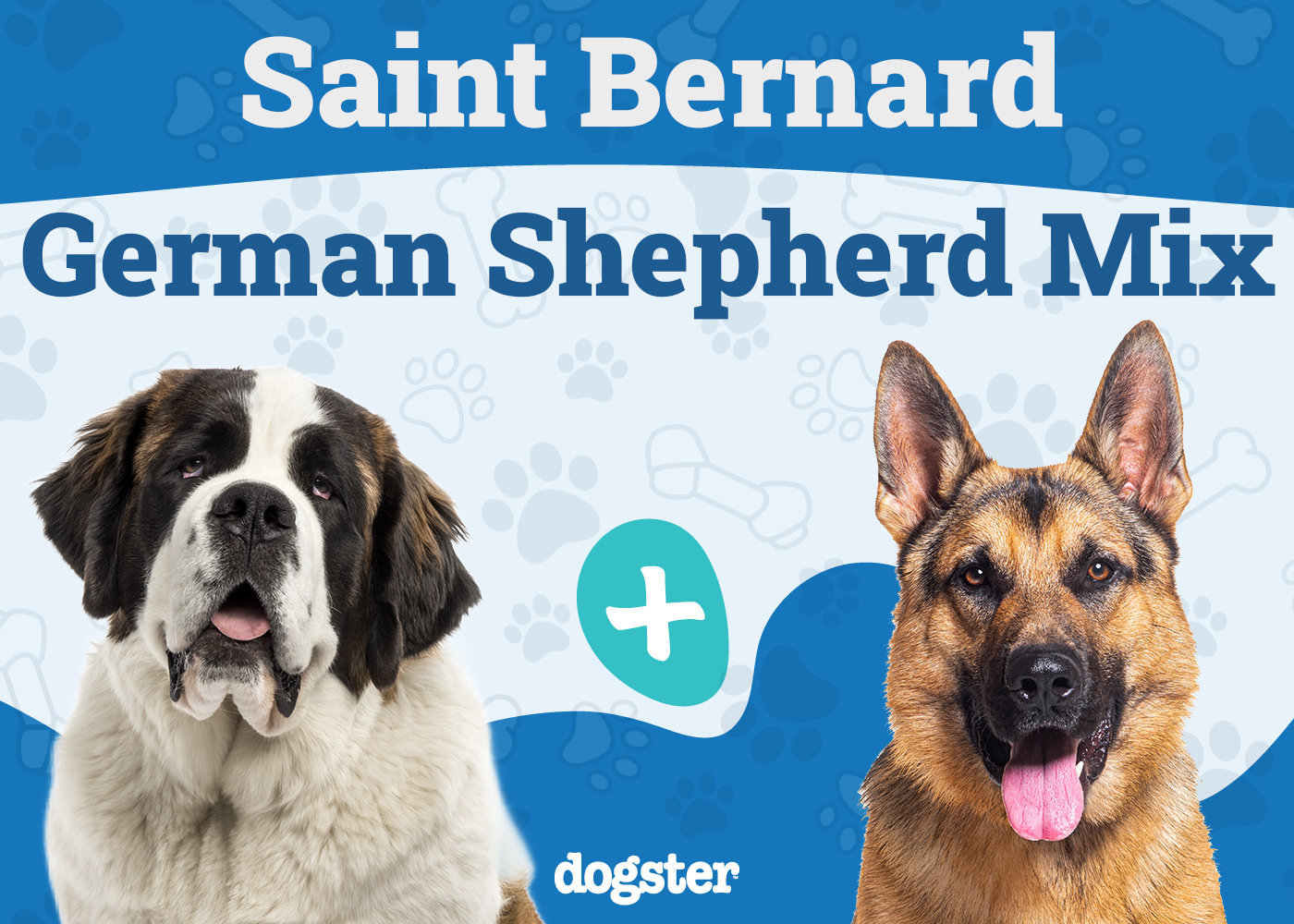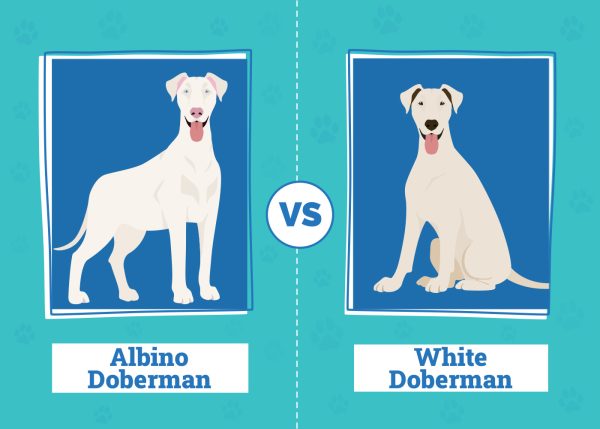In this article
View 8 More +The Saint Shepherd is a relatively new and uncommon hybrid dog breed. They’re known to have the intelligence of a German Shepherd and the gentleness and less intimidating appearance of a Saint Bernard. They’re the happy medium between two wonderful and popular dog breeds, and getting to meet one is truly a delightful experience.
Breed Overview
Height:
25–30 inches
Weight:
95–180 pounds
Lifespan:
9–14 years
Colors:
Brown, black, white
Suitable for:
Active families, single-family homes, experienced dog owners
Temperament:
Loyal, loving, intelligent, easy to train
The Saint Shepherd is a mixed dog breed that’s a cross between a Saint Bernard and a German Shepherd. While there’s still much to discover about this new dog breed, we do know that they tend to be affectionate and loyal family dogs. They may be large, but they’re usually very gentle and patient with children. Along with being good with children, many people are charmed by their calm and confident personalities.
Saint Shepherd Characteristics
Saint Shepherd Puppies
Saint Shepherds are uncommon, and there aren’t very many breeders. Along with the low number of Saint Shepherd breeders, there aren’t any official Saint Shepherd breed clubs with a breeder registry. So, it can be difficult to find and connect with a breeder.
You can expect Saint Shepherd puppies to be very playful, and it can seem like they have an endless supply of energy. They also tend to take a little longer to mature and reach adulthood. So, they can retain their puppy-like tendencies for a couple of years.
While early training and socialization are important for all puppies, it’s especially crucial for Saint Shepherd puppies. They grow quickly, and it may be cute to see a small puppy jump and be excited to see you, but it can quickly escalate to a safety issue as they grow. Growing Saint Shepherd puppies can also easily access hard-to-reach places and become experts at swiping food off kitchen counters and dining tables. Starting training as soon as possible will help immensely with keeping everyone in your home safe.

Temperament & Intelligence of the Saint Shepherd 🧠
Saint Shepherds typically inherit the intelligence and intuition of their Saint Bernard and German Shepherd parents. These dogs are highly intelligent and require daily physical and mental exercise. Because they’re so smart, they tend to get bored easily and need exercise and enrichment activities incorporated into their daily routine. Bored Saint Shepherds often resort to expressing their pent-up energy through destructive means, and they can cause a significant amount of damage because of their large size.
Are These Dogs Good for Families?🏡
Saint Shepherds typically become loving and loyal family dogs. They can be good playmates with children, but both Saint Shepherds and children must learn to interact with each other appropriately. Saint Shepherds may not be aware of their large size and must learn not to play too roughly with children and risk knocking them over. Children must also learn to respect a Saint Shepherd’s need for space and how to pet them appropriately and avoid pulling on their ears or tails.
Saint Shepherds usually become protective of younger children in the family. While they’re often easygoing and friendly towards strangers, they may need a little more time and exposure to how children play. They can interpret children running around as a sign of danger and may try to intervene. Letting them observe and learn how children play can help them understand that no one’s in danger.
Does This Breed Get Along With Other Pets?🐶 😽
With early socialization, Saint Shepherds can live harmoniously with other pets. They usually get along great with other dogs, but other kinds of smaller pets may feel intimidated by their large size. So, while Saint Shepherds may be perfectly fine living with other pets, small pets just may not feel safe or comfortable around them.

Things to Know When Owning a Saint Shepherd:
Food & Diet Requirements🦴
Saint Shepherds usually grow to the size of giant dog breeds and will benefit from eating dog food specifically formulated for larger dogs. They’re prone to developing hip and joint issues as they age, so they’ll benefit from eating food enriched with antioxidants and omega fatty acids. They’re also susceptible to having allergies, so some may require eating limited-ingredient diets.
It’s also important to note that Saint Shepherds are prone to developing dilated cardiomyopathy, and grain-free diets are under investigation for links to canine dilated cardiomyopathy. While more research must be completed to develop more concrete information, grain-free diets can be risky for Saint Shepherds to eat, and it’s important to consult your veterinarian before switching a Saint Shepherd to a grain-free diet.
Exercise🐕
The amount of exercise a Saint Shepherd requires depends on how closely their energy levels match a German Shepherd’s energy. In general, they’ll need between 45 to 70 minutes of physical exercise every day.
It’s important to provide an adequate amount of exercise without overdoing it because Saint Bernards are prone to overheating. So, a Saint Shepherd may require more frequent breaks from exercising, especially if they have a longer coat.
Along with physical exercise, Saint Shepherds need a lot of mental enrichment activities. If they don’t get adequate amounts of mental stimulation, they’re quick to become bored and likely to engage in destructive activities. Due to their large size, they can quickly ruin and destroy furniture and create a huge mess in the house.
Training🦮
Saint Shepherds are highly intelligent dogs that tend to be easy to train. They’re usually a little more eager to please than German Shepherds and enjoy short and fun training sessions. They typically excel in obedience training and can become successful working dogs and search and rescue dogs.
Early socialization is especially important for Saint Shepherds because of their large size. They’re not known to have aggressive or anxious tendencies, but leaving aggressive behaviors unaddressed can become a significant safety liability.
Grooming ✂️
Both German Shepherds and Saint Bernards can be heavy shedders, so a considerable amount of shedding from Saint Shepherds is expected, especially during seasonal shedding times. Regular brushing can help maintain shedding around the house and prevent mats and tangles in their coats. They usually benefit from getting bathed every 5–7 weeks. It’s important to check their ears and clean them regularly, especially if they resemble the Saint Bernard’s long ears.
Health and Conditions❤️
The Saint Shepherd is predisposed to certain health issues commonly found in German Shepherds and Saint Bernards. Here are some health conditions that you can expect to see, especially as these dogs age.
- Allergies
- Hip dysplasia
- Entropion
- Gastric dilation-volvulus
- Dilated cardiomyopathy
- Degenerative myelopathy
Male vs Female
Other than a slight size difference, male and female Saint Shepherds don’t have many distinguishable features or personality traits. Females are usually smaller than males in the same litter. However, there isn’t a standard size for Saint Shepherds, so the sizes of Saint Shepherds vary greatly.

3 Little-Known Facts About the Saint Shepherd
1. Saint Shepherds are a relatively new hybrid breed.
It’s unclear as to when Saint Shepherds first appeared. Because they’re pretty new and uncommon, there’s not much that’s known about them. Much of the information we have on these dogs is based on the wealth of information we have on German Shepherds and Saint Bernards.
2. Saint Shepherds can be good therapy dogs.
Saint Shepherds tend to be calmer than German Shepherds and have a friendlier, fluffy appearance. They tend to be very attuned to human emotions and are easy to train. Since they possess a lot of desired qualities of therapy dogs, they can be good candidates for therapy dog work. The only setback would be their high-shedding coat, which would prevent them from seeing people with dog allergies.
3. Caring for Saint Shepherds is often expensive.
Bringing home a new dog will always have a significant impact on your budget, but Saint Shepherds tend to be more expensive. Their large size means that you’ll have to purchase larger pet supplies and equipment, like dog beds, crates, collars, and leashes. Pet products sized for bigger dogs are often significantly more expensive than products made for small dog breeds. You’ll also have to consider Saint Shepherd’s large appetite and how much more you’ll spend on food and treats. On top of all this, vet bills, grooming, and pet insurance are also more expensive for larger dogs.

Final Thoughts
Saint Shepherds are versatile dogs with a lot of potential. They can be strong working dogs, calming therapy dogs, and gentle companions for children. While there’s still much to discover about this hybrid dog breed, what we do know is that they’re capable of becoming extremely loyal and loving companions. It’s no surprise that they’re gaining more recognition, and we wouldn’t be surprised to see them becoming more common in the years to come.
See Also:
- St. Bullnard (St. Bernard Pitbull Mix): Care, Pictures, Info, & More
- Male St. Bernards vs Female St. Bernards




















